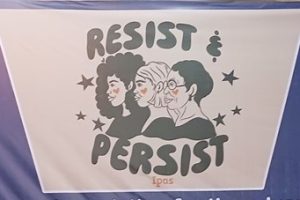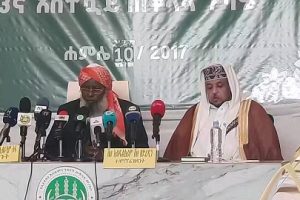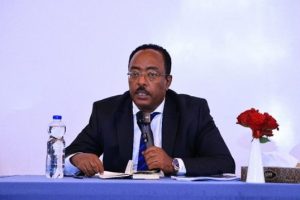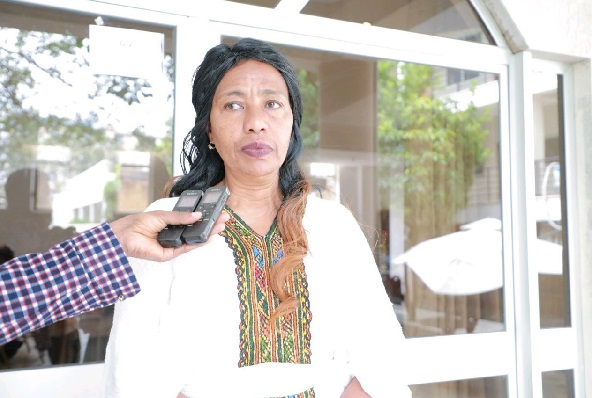
.Launches coalition of self-help groups to maximize support
When Nigatua Mekonnen, a resident in Adama city of Oromia state, found herself in harsh economic conditions 20 years ago, she and her family endured an indescribable hardship. This challenging period continued until she joined a local self-help group initiated by the Ethiopian Kale Heywet Church Development Commission (EKHCDC) to support people in despair like her.
The self-help group had enabled her to bring about behavioral change towards winning life through minimum savings and small businesses. Then, she began saving with an initial 0.50 cent, took a financial loan from the group and started an animal fattening business which totally changed her life and empowered her to educate and graduate her children, who are currently working in various organizations. Nigatua is now a member of the leadership of the self-help groups in which she is actively engaged in training programs sharing her life experience to trainees across the country.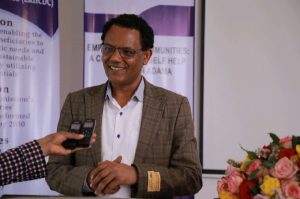
The self-help group concept that was introduced with 100 Birr credit two decades ago has now reached a financial capability to provide a 600,000 Birr credit to members. EKHCDC’s Livelihood, Development and Disaster Response Programs Director Dinku Shumi expressed that his commission promotes community-led sustainable development with the active participation of self-help local groups, which is why it introduced the concept in 2002 by drawing lesson from India. “It is all about bringing communities together to form their own institution that help them to collaborate with governmental and nongovernmental organizations to protect their rights and benefits,” he said.
A coalition of three self-help groups under the umbrella of Yenege Tesfa Self Help Collaboratives was launched last Saturday in Adama by EKHCDC. During the event, Nigatua elaborated on the invaluable role of self-help groups in achieving sustainable development. She also presented this year’s plan of the coalition designed to support thousands of citizens in education, health and livelihood improvement.
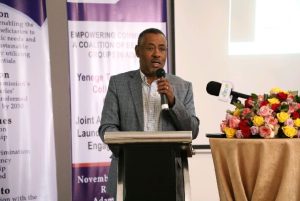
The establishment of the coalition is a significant step in the development of the local groups, enabling them to administer their activities independently, support their members, and cooperate with partners, said EKHCDC Commissioner Tefera Talore (PhD). The coalition now has10,800 individual members, 46.3 million Birr in savings and a total capital of over 83 million Birr. It envisions the realization of an economically developed, technologically advanced, self-empowered and committed community for sustainable development. The coalition spent a total budget of 26 million Birr in the first year to work on sustainable livelihood development, health and education, in addition to other capacity building activities.
According to Dinku, EKHCDC is working with international partners including Warande Advisory Center and Share trust. These organizations promote the concerted efforts among self-help local groups established to achieve community driven development.
During Saturday’s event, Warande Advisory Centre LCA Co-Founder and Partner Chilande Kuloba-Warria expressed her optimism towards the success of the coalition, saying,“ I see a community where every voice is heard, every leader is empowered, and every child has a chance to dream. It is a vision today, because we are making it happen.”
She believed that the establishment of the coalition is a showcase of the success of individuals who came together and took charge of their future. The self-help groups incorporated under this coalition are the quintessence of success achieved through a collaborative effort of contributions from every member, including solutions towards overcoming challenges.
“I myself, and I think, my colleagues, are products of self-help groups.” Growing up through such groups in Kenya, she was able to move to Nairobi for a better life from her rural village, located near the border between Kenya and Uganda.
Sustainable development must be rooted in local context, as any other plan imposed on the people will not succeed. The self-help group model is truly where everything should start, as they represent trust, accountability and shared responsibility, which are the values of a thriving community. These groups are models of inclusion, innovation and impact. Mentioning the local groups’ role in supporting people to make money, get an education, Chilande suggested that their impact will go beyond Ethiopia.
BY YOHANES JEMANEH
THE ETHIOPIAN HERALD TUESDAY 26 NOVEMBER 2024


